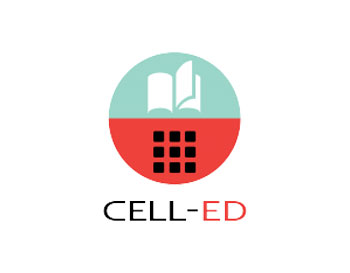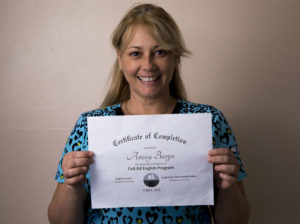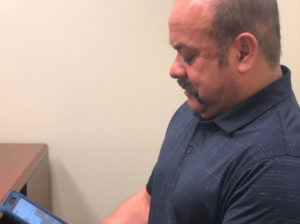
Cell-Ed: Literacy, Language and Job Upskilling in the Palm of the Hand
Mobile learning is an effective means of extending instruction, offering anytime, anywhere educational opportunities to the millions of adults motivated to upskill but unable to attend in-person classes. After field testing Cell-Ed, a mobile learning tool that teaches literacy, language, and job skills via three-minute micro lessons, here’s what we learned:
Key Learnings:
- Mobile learning, with short, digestible lessons, helped learners make use of the time they have to study on the go: Ninety-five percent of workers in the blended learning field test studied regularly outside of class, with a few studying over 130 hours during the course of the field testing.
- Mobile learning supported by differentiation and complemented with a human connection increases persistence: Cell-Ed provides learners a live coach who follows and supports each learner, using texting and even phone calls to nudge, motivate, and provide feedback and further instruction. The amount of in-person practice, individual coaching, and/or coaching support a learner received correlated with greater persistence.
- Blended learning leads to independent learning: Learners engaged in high-quality blended learning were more successful learning independently after classes than learners working independently from the start.
- Mobile learning is not always on a smartphone: Adults in lower wage jobs need learning that can happen on a simple cell phone without Internet access. Cell-Ed learners study through interactive text and audio voice lessons narrated by real teachers—whether using an app or simply calling in—no Internet or data plan required.
- Learners desire learning that is specific to their jobs and daily lives to increase motivation and support advancement: There is a real need for these workers to gain proficiency in both daily, general English that can support oral and written interaction on the job and domain-specific vocabulary that they need to communicate about their jobs.
Field Testing Cell-Ed:
We tested Cell-Ed in several workplace ESL scenarios with immigrant workers, including a blended learning setting for frontline hotel employees and an independent learning use case for homecare workers. Its range of use scenarios suggests that Cell-Ed is a valuable addition to an employers’ instructional resources to help workers make positive gains in language, literacy, and job skills.
How We Know It Works:
- Advancement and wage gains: We witnessed home care workers qualify to earn a 10 percent wage increase after studying on Cell-Ed to successfully pass English assessments.
- Increased learning gains: Seaport hotel employees who studied regularly on Cell-Ed showed ESL score gains on the TABE and Best-Plus assessments.
- Persistence: Ninety-five percent of hotel workers studied regularly outside of class, with a few studying over 130 hours.
Why it Works for Working Adult Learners:
 |
Mobile Learners can learn on-the-go, anytime, anywhere. |
 |
Digestible Interactive micro lessons in 5- to 10-minute bursts support retention. |
 |
Easy to use The tool is accessible for learners with limited digital literacy. |
 |
Multi-platform It works for learners on simple phones without Internet access, or on smart devices. |
 |
Human touch Coaching and two-way messaging support user persistence and provide tailored learning. |
 |
Career-aligned Relevant, job-specific learning supports engagement and career opportunity. |
Field Testing Partners
- United HomeCare, Miami, FL
- National Domestic Workers Alliance, Miami, FL
- Seaport Hotel, Boston, MA
- Service Employees International Union, New York, NY
Field Testers:
150 immigrant service workers
with Limited English Proficiency working as frontline hotel employees and as home health aides (HHA’s)

“Our field tests are helping us better understand the needs of our users to continuously improve Cell-Ed’s products and services to increase access, engagement, and skill building. For example, pilots with hotel and healthcare workers sparked improvements such as wallet cards for onboarding workers at Seaport Hotel to blending Cell-Ed’s essential skills English with home healthcare training for Miami home care providers.”
Jessica Rothenberg-Aalami
CEO, Cell-Ed

“Field testing Cell-Ed showed us that mobile learning is a critical strategy for United HomeCare to continue to deploy. With the aging baby boomer demographic in Miami and the fierce competition between employers for talent, we will need to upskill hundreds of home care aides to provide care in English. Motivated employees such as Aneisy proved they could study on their phones and learn critical language skills to advance in their careers. We will continue to work with our partners to innovate on ways to make career advancement training available to all frontline health care workers in Miami.”
Jacqueline Torre
Vice President, Human Resources & Talent Development, United HomeCare
Cell-Ed Stories:
 Aneisy, United HomeCare
Aneisy, United HomeCare
“I used to be bored at my kids’ soccer practices and swim lessons, but now I study English on my phone.” A recent immigrant from Cuba, Ana is a mother who juggles multiple clients she cares for as a home health aide with a regularly changing schedule. Ana studied on Cell-Ed for over 30 hours on breaks at work or late at night at home. “I learned new vocabulary words, like linens, pants, diapers, that I need to better communicate with my clients,” she said. After studying on Cell-Ed, Ana demonstrated to her employer that she had learned the specific English she needed to care for English-speaking clients and thereby qualified for a 10 percent wage increase.
 Julio, Seaport Hotel
Julio, Seaport Hotel
When recent immigrant Julio started workplace English classes at the Seaport Hotel that he cleans, teachers worried he might drop out of class, as his English was far below that of his coworkers. Fortunately, he was able to study both inside and outside of class on a Pre-ESL level of Cell-Ed that offers bilingual instruction. His teacher credits Cell-Ed for his stunning progress in learning new vocabulary and starting to speak confidently in just a few weeks with accurate pronunciation.
View the full report, Field Testing Cell-Ed: Mobile Learning for All.
